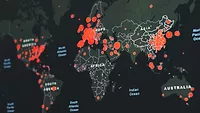New WHO Alliance for Food Safety to Increase Global Capacity for Foodborne Illness Surveillance

Image credit: geralt via Pixabay
The World Health Organization (WHO), in collaboration with the European Centers for Disease Control and Prevention Division of Foodborne Waterborne and Environmental Disease (CDC DFWED), is launching the WHO Alliance for Food Safety to meet foodborne disease surveillance targets set in the WHO Global Strategy for Food Safety 2022–2030. The WHO Alliance for Food Safety will convene for its inception meeting from May 6–8, 2024 in Geneva, Switzerland and virtually.
The WHO Global Strategy for Food Safety 2022–2030, which was adopted in May 2022, sets out five strategic priorities for the advancement of food safety and target goals to guide action and track progress toward reducing foodborne illnesses worldwide. One such target goal is to increase the global capacity for surveillance of foodborne diseases and contamination from a score of 1.5 in 2022 to 3.5 by 2030 (based on the International Health Regulations Joint External Evaluation Tool). To align efforts across countries and support capacity-building efforts, WHO and CDC hope to reactivate WHO’s Global Foodborne Infections Network (GFN) and tap into its network of Collaborating Centers to serve as the basis of the WHO Alliance for Food Safety. The Alliance will also include other institutions with demonstrated leadership and technical competency.
Between 2001 and 2015, GFN served as a capacity-building network consisting of institutions and individuals working in veterinary, food, and public health disciplines committed to enhancing the capacity of countries to detect, control, and prevent foodborne and other enteric infections. GFN promoted integrated, laboratory-based surveillance and outbreak detection and response, and fostered intersectoral collaboration and communication among microbiologists and epidemiologists in human health, veterinary, and food-related disciplines. Discussions with former members of the GFN steering committee and WHO staff who worked on this network highlighted the importance of linking GFN with the WHO Food Safety Strategy, with the Foodborne Disease Burden Epidemiology Reference Group (FERG), the FAO/WHO International Food Safety Authorities Network (INFOSAN), and other programs supporting foodborne illness reduction, antimicrobial resistance (AMR) mitigation, and strengthening governance and regulations for foodborne disease surveillance.
Additionally, more than 20 WHO Collaborating Centers were identified having terms of reference related to the areas of the food safety strategy. An analysis of their workplans identified that it is necessary to better align their capacity building activities with the targets of the WHO Global Strategy for Food Safety.
Looking for quick answers on food safety topics?
Try Ask FSM, our new smart AI search tool.
Ask FSM →









